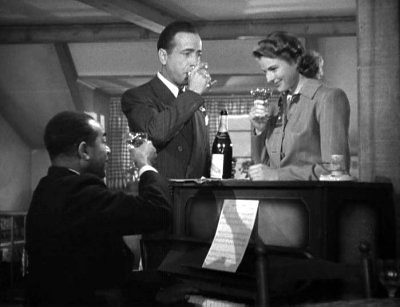
A prime example that I'll use from my childhood is the image of Betty Boop, the sexy Cartoon pin up girl. Betty Boop w
as cancelled back in the 1930's but remained popular in media and her entire cartoon series was re released in the 1990's. Betty Boop remains a popular mainstream character and is the subject of many tattoos, advertisements, books, and even bed sheet sets. But we should ask why exactly, has Betty Boop remained so popular. For a second lets stare at the character.Although Betty Boop had at first been played by an actress and was an actual person in the 1930's, she then turned into this comic below.Shes the epitome of this male gaze,written by Laura Mulvey. Mulvey says"The determining male gaze projects its fantasy on the female form which is styled accordingly,...with their appearance coded for strong visual and erotic impact so that they can be said to connote to-be-looked-at-ness."
Her dress is barely long enough to cover her thighs and butt.It also doesn't have any straps to hold it up over her enormous breasts.The top of the dress is also shaped into a sweet heart neckline, meant to enhance the curve of her breasts in the center.She wears a garter with a heart and in almost every picture of her the garter is exposed, almost like its inviting men to try to take it off.Her eyes are wide open, giving her a deer in head lights look. It gives the impression of shallowness and naivete,as if she'll believe anything a man says to her. She constantly is shown with her little dog,who is most often pulling at her gown,as if hes on the males side,trying to get it off. Lastly Her demure expression bring her character together.She gives off the impression of shyness, coupled with her hand over her mouth or her constantly puckered red lips, its as if she becomes just a token for women everywhere, that they should be seen
and not heard. There only there to be looked at and not much else, which perfectly exemplifies the male gaze.
The oppositional gaze is another gaze thats prolific in mainstream media. This type of Gaze, according to Bell Hooks, is how she looks at mainstream media and that has
developed in Black and minority culture. Bell Hooks, a black sociologist watched as African american characters in media were subservient slaves or bit actors. African Americans were rarely shown on screen and when they were they usually took the part of a servant or an obscure farmhand. The oppositional gaze developed because African Americans couldn't identify with any of their African American counterparts on screen.They started looking at media as an opposition to their freedom and rights, only maintaining white supremacy and keeping their African american counterparts "in their place"
Amos and Andy are a prime example of this. The most obvious issue with these characters are that th
eyre played by white men, as if African American men are not good enough to play African American men on screen. The second problem with this is that both characters were fools, constantly doing the most idiotic things. Of course it seemed funny,but neither character
was multi dimensional in that an African American would identify or even want to identify with these men. These one dimensional characters showed negative or non existent aspects of African American culture.,as if a few stupid laughs were all African Americans were good for.
Its weird how I never noticed before the sly undertones set by mainstream media before Id taken some Media classes. When it isn't presented in your face, you don't realize how deep down this pervasive structure goes. Where I once woke up in the morning and just put on what I like, I find myself thinking why do I like what I like? Is it because I like the style or maybe because the fit looks good on me and everyone that is looking will know it looks good on me? The same thing happens in movies and the games I play where I find myself question

ing characters and their purpose. For example the movie Casablanca, which is one of my favorites movies of all time is subject to critical thought. Ilsa, the female lead in the movie,is a pretty perfectly coiffed woman who is
constantly being told what to do. She doesn't have any major intelligent breakthroughs in the movie at all and is told by Rick to leave, and she just follows his orders. Sam, the African American piano player is only that, a piano player, Ricks sidekick. He often tells Rick that Ilsa will bring danger and misfortune his way and Rick usually tells him to shut just be quiet and play the piano,as if thats all hes good for.
No comments:
Post a Comment